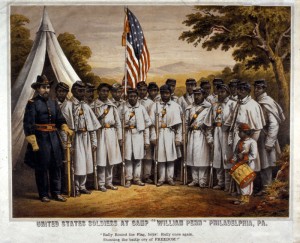 On Friday I posted a couple of newspaper notices on the subject of black Confederates from Vicki Betts. Here is one more from a Memphis newspaper for your consideration.
On Friday I posted a couple of newspaper notices on the subject of black Confederates from Vicki Betts. Here is one more from a Memphis newspaper for your consideration.
MEMPHIS DAILY APPEAL [MEMPHIS, TN], May 14, 1861, p. 3, c. 2
Our Free Colored Men–What Shall Be Done With Them?–Editors Appeal: The proposition of the committee of safety, to enlist companies of our free colored men, is not relished by our citizens generally; and the question comes up, “what must be done with them?” Let me suggest to that committee that they confer with Major-General Pillow as to the policy of placing four or five of our free negroes in each company from Memphis, for cooking, washing, etc. That is their post, one of inferiority, not of citizen soldiers. They understand that sort of work better than any boys who are called to do battle. Let them be made useful in that way.
Common Sense.
Sounds like a similar statement
“I will say, then, that I am not, nor have ever been in favor of bringing about in any way the social and political equality of the white and black races … I am in favor of having the superior position assigned to the white race.” -Abraham Lincoln
Yes, Lincoln’s racial outlook is well known.
I think it should also be remembered that one earned money (at least in terms of it was said you’d get paid) for performing duties. Free black Southerners tended to gravitate toward towns and cities in hopes of better jobs and greater community in larger numbers. However, you end up with multiple people of the same skill, limited skills, no skills and various forms of education levels.
For some of these free blacks, cooking, working as laundresses in hospitals, nurses in hospitals, etc. was a means to, in part, not upset the traditional white Southern mindset which still dominated the lives of free blacks while also attempting to secure the fiscal well-being of individuals’ and families’ in the midst of a very tumultuous and perplexing period of the war.
Seems well within the range of opinion of the time. Some would want to: “enlist companies of our free colored men”. Others would oppose any such use. There would be extremes on either side, as well as a lot of people somewhere in between.
No worries.
This is interesting, because this short article does not exhibit the fear that existed over arming slaves and seeing them fight. That is the typical reason I read about why the Confederacy did not arm blacks. Given that these are free blacks, they had no masters to rebel against. Instead, it perpetuates the belief that white Southerners are superior fighters on the battlefield, although no major open-field battle had taken place yet. It also perpetuates the notion that blacks make poor soldiers, something that many in the Union army believed in the first few years as well.
This does seem indicate that there were free blacks looking to serve in the Confederate military or at least contribute to the war. There was no draft at this point, so how else would they “enlist”?
How did I do?
It may be premature to suggest this, but I tend to think that the doomsday scenarios over arming blacks is more prevalent by the middle of the war. Petersburg, Virginia is another place where you find free blacks offering their services to Virginia and the Confederacy. Will Greene spends some time on this in his excellent study of wartime Petersburg. The problem is that we don’t have the kinds of documentary evidence that might help us to explain why they did. Loyalty and sense of place is certainly one possibility, but I suspect that free blacks also understood that they occupied a precarious position at the beginning of the war.
Was the “Common Sense” at the end your comment or was that actually part of the article?
Part of the article. Sorry about that.